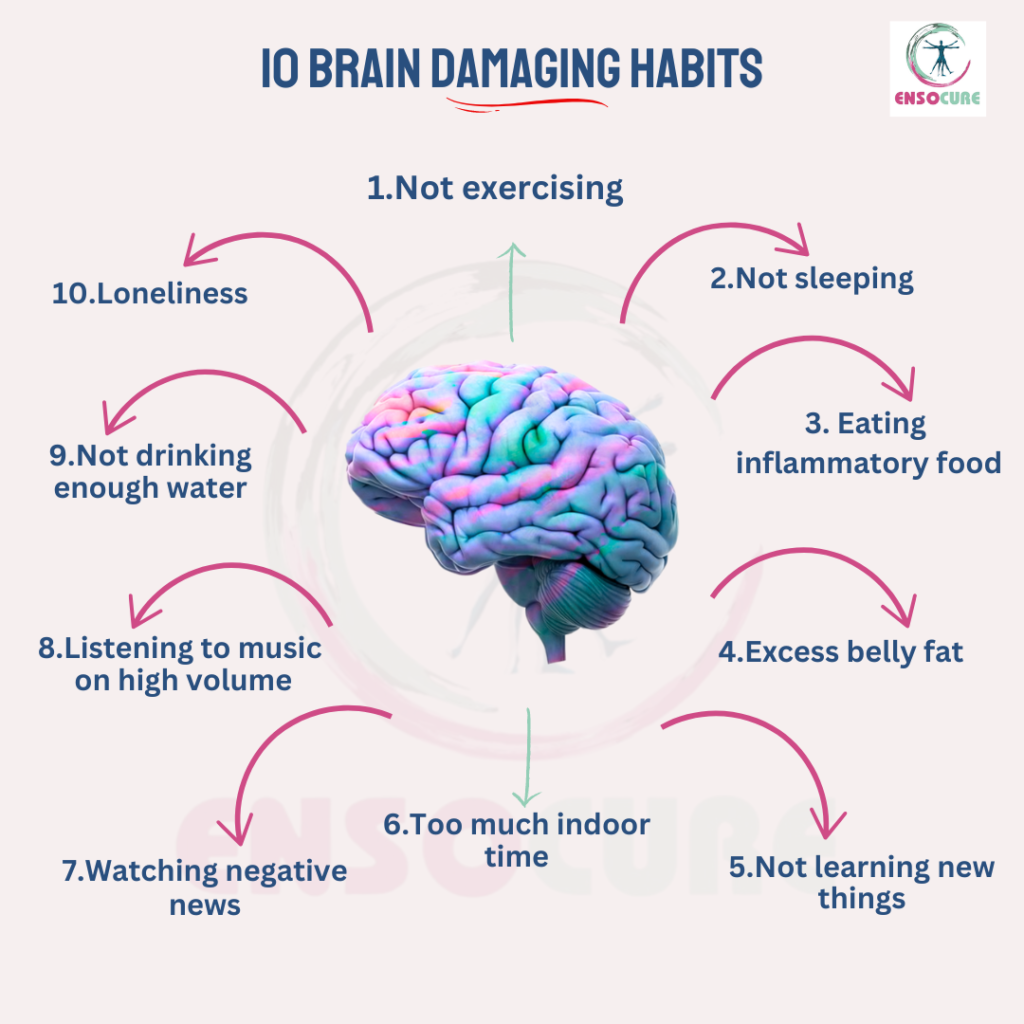Your brain is an incredible organ that governs every aspect of your life, from your thoughts and emotions to your movements and memories. However, certain habits can have a detrimental effect on brain health, potentially leading to cognitive decline and other neurological issues. Here are ten common brain damaging habits you need to avoid.

1. You don’t exercise
Engaging in regular exercise enhances memory by boosting levels of brain-derived neurotrophic factor (BDNF), which contributes to the formation of new synapses, and enhancing learning and memory. Sedentary behavior, characterized by activities such as sitting or leaning, negatively impacts both physical and mental health leading to brain atrophy. Increased inactivity is associated with higher levels of anxiety, depression, and other adverse effects. Therefore, it is advisable to incorporate daily exercise into your routine and occasionally break away from prolonged sitting. Exercise is also good for managing stress and anxiety so just get out of your chair.
2. Lack of sleep
Among brain damaging habits, inadequate sleep affects cognitive function, with one-third of adults failing to achieve the recommended seven to eight hours of sleep per night according to the CDC. Research published in the December 2018 issue of Sleep indicates that cognitive skills, including memory, reasoning, and problem-solving abilities, decline with insufficient sleep. Quality sleep is essential for the formation and maintenance of neural pathways necessary for learning and memory consolidation, as well as for sustaining attention and quick responsiveness. Prolonged sleep deprivation may even contribute to the development of neurological diseases.
3. Eating inflammatory and unhealthy food
Dietary choices directly impact mental health, with a diet high in fried and processed foods contributing to chronic inflammation. Such dietary patterns are associated with memory impairment, mood instability, confusion, depression, and neurological disorders.
4. Excessive abdominal fat
Excessive abdominal fat promotes inflammation, resulting in brain shrinkage and a decline in gray matter, which regulates movement, memory, and emotions. Researchers from Rutgers University found how abdominal fat impacts brain health and cognition among people at risk for Alzheimer’s disease.
5. Not acquiring new knowledge or learning
The brain is like a muscle that requires stimulation to grow and function optimally. Learning new skills fosters neuronal growth and the formation of neural pathways, preventing brain atrophy.
6. Spending too much time indoors
Spending excessive time indoors limits exposure to sunlight, disrupting circadian rhythms and serotonin levels, potentially leading to seasonal affective disorder and depression. Moreover, sitting too long is also among brin damaging habits which forces you to stay indoors and can adversely impact your health.
7. Watching too much negative news
Overconsumption of negative news can trigger excessive stress reactions, reducing blood flow to the brain and contributing to arterial hardening, which impairs cognitive function. Engaging in deep breathing exercises or redirecting attention to immediate surroundings can mitigate these effects.
8. Listening to music on high volume
Prolonged exposure to high-volume music through headphones can permanently damage the hair cells in the ear, altering speech perception and potentially impairing communication abilities.
9. Not drinking enough water
Maintaining proper hydration is crucial for brain health. Not drinking adequate water is one of the worst brain damaging habits as approximately 90% of the brain is composed of water. Dehydration can lead to cellular shrinkage and impaired cognitive function. Drinking an adequate amount of water throughout the day is essential for both physical and mental well-being. Aim for 8-10 glasses of water daily.
10. You don’t socialize
According to studies, loneliness is linked to depression and a higher risk for Alzheimer’s and can accelerate cognitive decline. Building social ties, family connections and social support are practices for a happier and healthier brain.
How to keep your brain healthy
- Exercise regularly
- Get quality sleep
- Eat nutrient dense foods
- Keep a healthy BMI
- Keep learning new things
- Get outside in nature
- Get your omega 3 fatty acids
- Avoid excessive alcohol
- Avoid smoking
- Maintain your blood sugar
- Maintain your blood pressure
- Improve cholesterol
- Manage stress
- Don’t isolate and make friends
Adopting healthy lifestyle habits is crucial for maintaining optimal brain health and function. By avoiding these five bad habits and prioritizing activities that support brain health, such as regular exercise, adequate sleep, a nutritious diet, stress management, and moderation in alcohol consumption, you can protect your brain and reduce the risk of cognitive decline as you age. Your brain is your most asset, so treat it with care and respect.

